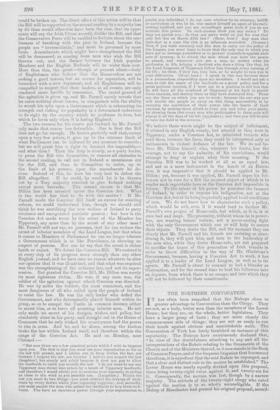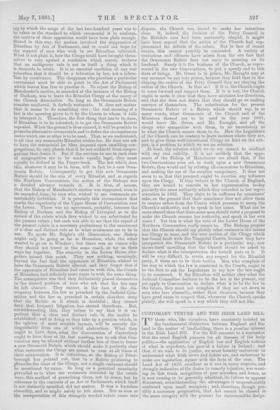THE NORTHERN CONVOCATION.
TT has often been remarked that the Bishops show to greater advantage in Convocation than the Clergy, They are not, as a body, bettor men than the members of the Lower House ; but they are, on the whole, better legislators. They have a larger grasp of facts ; they see more clearly the common-sense side of things ; they aro not so ready to run their heads against obvious and unmistakable walls. The Convocation of York has lately furnished an instance of this superiority. The Bishops have unanimously declared that, "In view of the doubtfulness attaching to any and all the interpretations of the Rubric relating to the Ornaments of the Church and of the Ministers thereof, as it nowstands in the Book of Common Prayer, and of the frequent litigation that has ensued therefrom, it is expedient that the said Rubric be expunged, and that a clear and distinct rule in the matter be estrtblished." The Lower House was nearly equally divided upon this proposal, there being twenty-eight votes against it, and twenty-six for it. Consequently, the motion was lost, though by a narrow majority. The attitude of the twenty-eight clergy who voted against the motion is to us wholly unintelligible. If the Bishop of Manchester had pressed his original proposal, accord-.
ing to which the usage of the last two hundred years was to be taken as the standard to which ceremonial is to conform, the motive of their opposition would have been plain enough. Stated in this way, the motion involved the suppression of Ritualism by Act of Parliament, and so could not hope for the support of men who wish to see Ritualism tolerated. What is not plain is, how the Clergy could have brought them- selves to vote against a resolution which merely declares that an ambiguous rule is not in itself a thing which it is desirable to retain. It is an essential condition of any real toleration that it should be a toleration by law, not a tolera- tion by connivance. The clergyman who practises a particular ceremonial must be able to point to the Act of Parliament which leaves him free to practise it. To reject the Bishop of Manchester's motion, as amended at the instance of the Bishop of Durham, was to leave the Ritualist Clergy at the mercy of the Church Association. So long as the Ornaments Rubric remains unaltered, it forbids vestments. It does not matter that it seems to do something else ; the real meaning of a law is the meaning given to it by the Courts to whom it falls to interpret it. Therefore, the first thing that has to be done, if Ritualism is to be tolerated, is to get the Ornaments Rubric repealed. When the ground is thus cleared, it will be possible to prescribe alternative ceremonials, and to define the circumstances under which one or other is to be used. That, as we understand, is all that any reasonable Ritualist wishes for. He does not ask to have the ceremonial he likes imposed upon unwilling con- gregations, he only pleads that it be not withheld from congre- gations that desire it. But if the services in use in each class of congregation are to be made equally legal, they must equally be defined in the Prayer-book. The law which does this, whatever it may be in form, will in fact be a new Orna- ments Rubric. Consequently, to get this new Ornaments Rubric should.be the aim of every Ritualist, and as regards the Northern Convocation, the action of the Bishops was a decided advance towards it. It is true, of course, that the Bishop of Manchester's motion was supported, even in its amended form, by men who wished to see vestments un- mistakably forbidden. It is precisely this circumstance that marks the superiority of the Upper House of Convocation over the Lower. There was no agreement, probably, between the Bishop of Durham and the Bishop of Liverpool as to the nature of the rubric which they wished to see substituted for the present rubric ; but each was able to see that the repeal of the present rubric is a necessary preliminary to the enactment of a clear and distinct rule as to what ornaments are to be in use. To quote Mr. Bright's old illustration, one Bishop might only be going as far as Hounslow, while the other wanted to go on to Windsor ; but there was no reason why they should not travel in the same coach, as far as their ways lay together. The majority in the Lower House alto- gether missed this point. They saw nothing, seemingly, beyond the fact that the opponents of Ritualism wished to have the Ornaments Rubric altered, and they forgot that if the opponents of Ritualism had cause to wish this, the friends of Ritualism had infinitely more cause to wish the same thing. The consequence was that they deliberately placed themselves in the absurd position of men who ask that the law may be left obscure. They cannot, in the face of the dis- crepancy between the law as preached by the Judicial Com- mittee and the law as preached in certain churches, deny that the Rubric' as it stands is doubtful ; they cannot deny that frequent litigation has ensued therefrom. But, notwithstanding this, they refuse to say that it is ex- pedient that a clear and distinct rule in the matter be established ; and in doing so they take up a position which, in the opinion of most sensible laymen, will be scarcely dis- tinguishable from one of wilful obstruction. What they ought to have done, what the Convocation of Canterbury ought to have done at its last meeting, was to ask that Con- vocation may be allowed without further loss of time to frame a new Ornament Rubric, which should make it perfectly clear what vestments the Clergy are meant to wear at all times of their ministration. It is ridiculous, as the Bishop of Peter- borough has pointed out, that in a Rubric professing to pIescribe the dress of the Clergy, not a single vestment should be mentioned by name. So long as a practical unanimity prevailed as to what the vestments intended by the rubric were, this method of prescribing them, not by name, but by reference to the contents of an Act of Parliament, which itself is not distinctly specified, did not matter. It was a harmless absurdity, and so might safely be left alone. But as soon as the interpretation of this strangely worded rubric came into
dispute, the Church was bound to make her intentions clear. If, indeed, the decision of the Privy Council in the Ridsdale case had been universally obeyed, it might have been argued that the action of the Church had sup- plemented the defects of the rubric. But in face of recent events, this cannot possibly be contended. A variety of confusions and offences have arisen from the one fact that the Ornaments Rubric does not carry its meaning on its forehead. Surely it is the business of the Church, as repre- sented in the two Convocations, to put a speedy end to this state of things. Mr. Green is in prison, Mr. Enraght may at any moment be put into prison, because they hold that in dis- obeying the orders of the Privy Council they are obeying the orders of the Church. Is that so ? If it is, the Church ought to come forward and support them. If it is not, the Church ought to make it clear that they have mistaken her directions, and that she does not desire that they should go on making martyrs of themselves. The substitution for the present Ornaments Rubric of a Rubric which should say., in so many words, what Ornaments of the Church and of the Ministers thereof are to be used in the year 1881, would leave Mr. Green and Mr. Enraght, and all the clergy who sympathise with them, in no uncertainty as to what the Church means them to do. How the Legislature of the Church can be content to leave matters whore they are, and to give these well-intentional Clergy no hint on the sub- ject, is a problem to which we see no solution.
At least, the solution which we do see cannot be credited, with any real validity. It is not unlikely that the oppo- nents of the Bishop of Manchester are afraid that, if the two Convocations were set to work upon a new Ornaments Rubric, they would end by refusing all concessions to Ritualism, and making the use of the surplice compulsory. It does not seem to us that this prospect ought to exercise any influence upon the Clergy. If they believe in the Church of England, they are bound to concede to her representation to-day precisely the same authority which they conceded to her repre- sentation in 1662. They claim to be sufferers for conscience' sake, on the ground that their conscience does not allow them to receive orders from the Courts which presume to usurp the Church's authority, and to speak in her name. What can be more absurd than that these same men should resist a proposal to make the Church resume her authority, and speak in her own name ? Yet this is what the vote of the Lower House of the Northern Convocation really comes to. The Bishops propose that the Church should say plainly what vestments she means her Clergy to wear, and the very section of the Clergy which has found fault with the Temporal Courts, because they have interpreted the Ornaments Rubric in a particular way, now shows itself unwilling that the Church should be asked to declare what is the interpretation she herself puts on it. It will be very difficult to retain any respect for the Ritualist party, if these are to be their tactics. Men who complain of the way in which the law is construed in the Courts, ought to be the first to ask the Legislature to say how the law ought to be construed. If the Ritualists will neither obey what the Judicial Committee declares to be the law in the present, nor yet apply to Convocation to declare what is to be the law in the future, they must not complain if they are set down as men who love obscurity, rather than clearness, because they have good cause to suspect that, whenever the Church speaks plainly, she will speak in a way which they will not like.



































 Previous page
Previous page